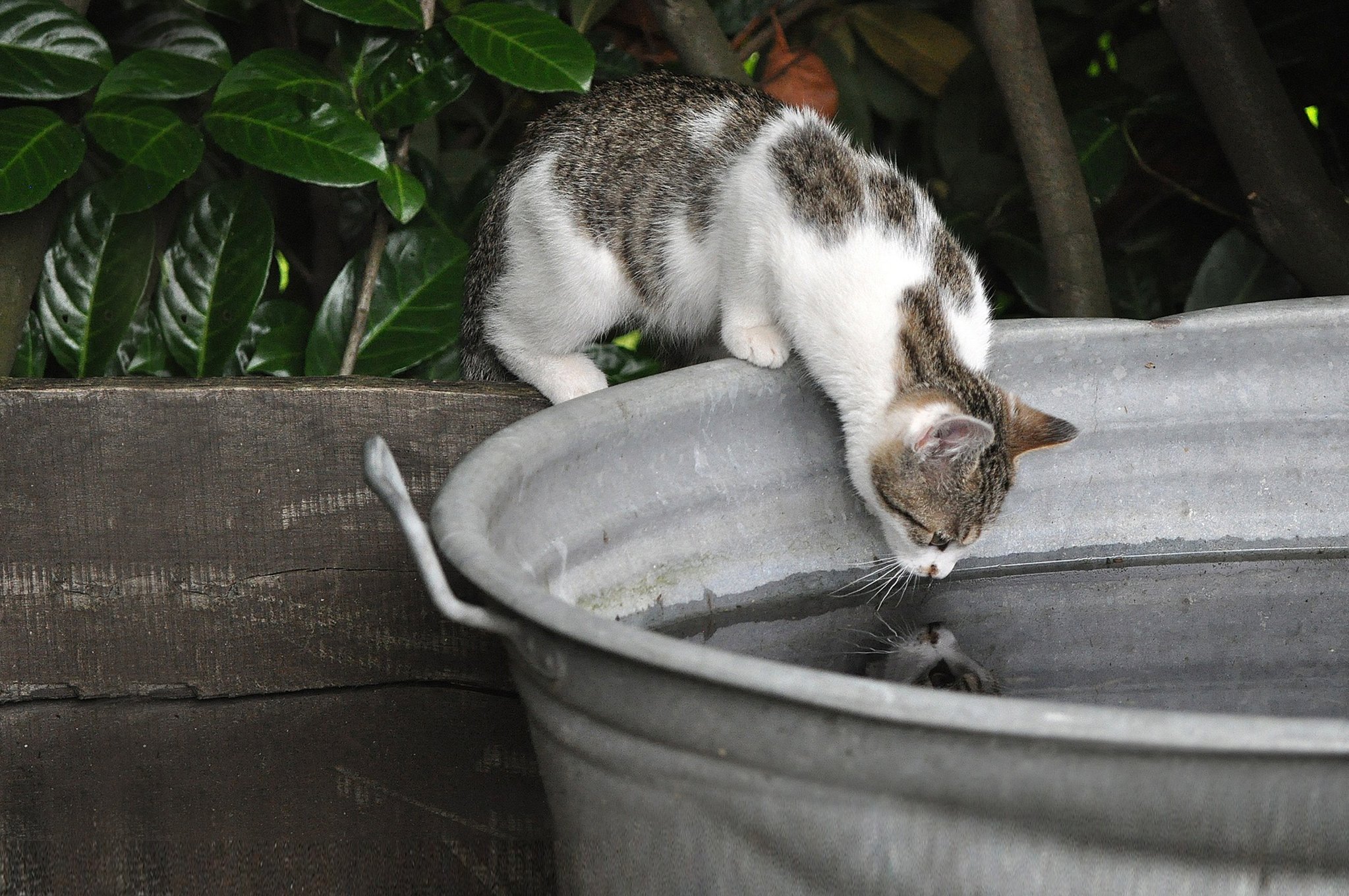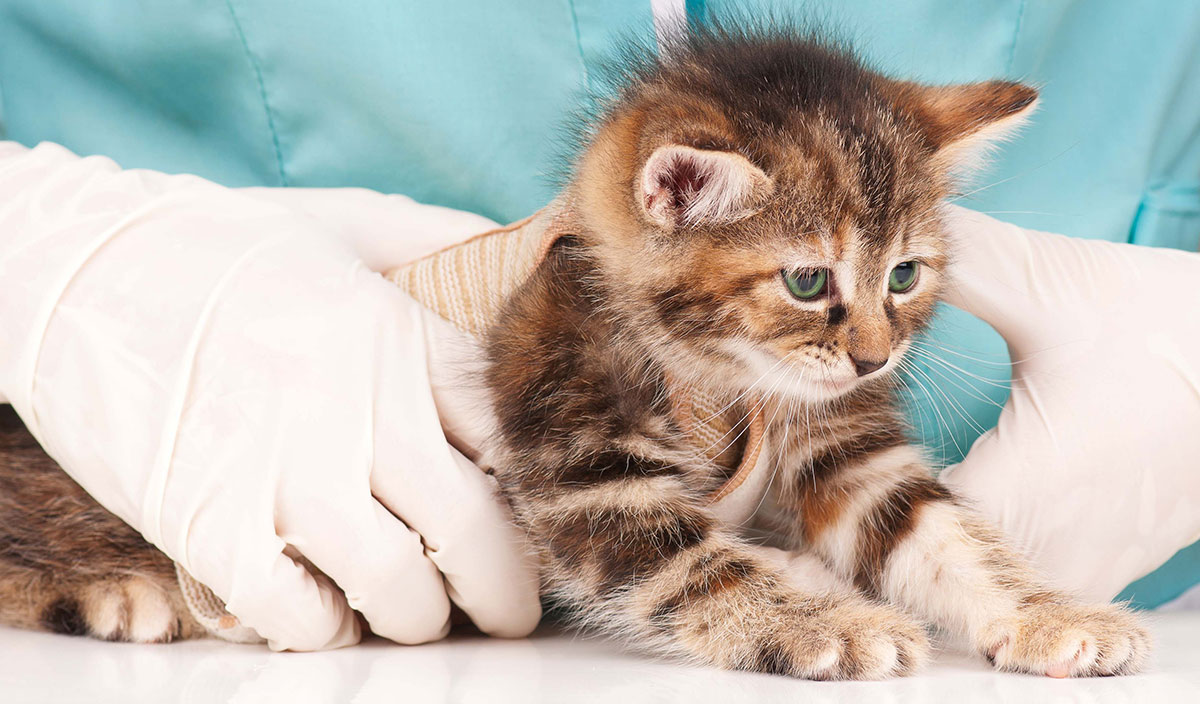
During parasite season, both internal and external, our cats begin to be very annoyed with them because they do not leave them alone for a moment. And it is that, even if they do not go abroad, we inadvertently could bring an unwanted guest, especially if we live in rural areas.
Let's see how often to deworm my cat, and give you the opportunity to enjoy the good weather to the fullest.
Types of parasites that cats can have

External parasites
External parasites such as fleas or ticks are, without a doubt, those that most disturb the tranquility of our friends, and also that of their caregivers. To prevent and / or remedy them, pipettes, sprays or necklaces are used.
- Pipettes: They are the easiest to apply, since it is only one dose per month and the animal is not usually scared. This type of treatment is the most suitable for those who go abroad.
- Spray: They are cheap, especially if we have only one cat. The downside is that, when cleaning, you could swallow insecticidal liquid and suffer some kind of allergic reaction. To avoid this, it must be applied as if it were a pipette, that is, with a few drops on the upper part of the neck, where there is no way to access it. It will be repeated every time we see a parasite, but without overdoing it.
- Necklaces: Of monthly or quarterly effectiveness, they are very effective when the animal does not go out more than the patio of the house.
Internal parasites
Internal parasites are those that live inside the body. It is generally recommended to give them a oral antiparasitic pill every three months, especially to keep your digestive system free of parasites that could cause health problems such as diarrhea or weight loss due to decreased appetite.
I would like to continue this article by also mentioning the natural antiparasitics, such as necklaces or pipettes with citronella. They do not have any side effects, and are ideal for those cats that have suffered an allergic reaction to the chemical components of antiparasitics that you can find in pet stores. If you choose to use this type of product, the dose will be that indicated by the manufacturer, but it is usually a pipette every 15 days, or a necklace per month.
Gastrointestinal parasites
Gastrointestinal parasites are internal parasites, but in addition to being common they can be dangerous and for those good idea to make a mention of it. Gastrointestinal parasites are a very common disease in kittens, and must be combated with standard preventive measures and proactive treatment as needed.
What is standard deworming?
All kittens should be treated for common parasites like roundworms and hookworms at 2, 4, and 6 weeks of age. This can be done at a vet or at home. To deworm a kitten at home, you will need a digital scale, a small syringe, and a bottle of oral dewormer that can be purchased online or at a pet supply store.
You will have to follow the instructions on the product to deworm your cat. Regardless of the age of deworming, always follow up with at least one more dose 2 weeks later.
And the additional deworming?
Some kittens will have parasites that are not covered by their standard dewormer, such as tapeworms, coccidia, or giardia. If your kitten is dewormed, but his stool still doesn't look right, ask your vet for a fecal exam to check for other parasites.
Coccidia is a nasty little single-celled organism that causes diarrhea mucosa in kittens and can be treated with the prescription drug Ponazuril. The giardia is another protozoan infection, causing mild, frothy, greasy diarrhea, which can be treated with Panacur. Tapeworms are often found in kittens that have had fleas, and they can be visible in the stool (they look like little grains of white rice) - you will need Praziquantel to get rid of them.
If the kitten has diarrhea, mucous or extra-stinky stools, or other gastrointestinal problems, a vet will do a fecal exam to determine which parasite is present and to obtain a prescription drug. Only a veterinarian can properly diagnose and prescribe treatment. If you suspect parasites, don't delay: Take your cat to the vet within 24-48 hours and quarantine him from other animals in the house to avoid contamination. Parasites are generally easy to treat, but they can be fatal if left untreated in a little kitten.
The benefits of deworming in cats
If you are thinking that deworming your cat is not necessary or you think that it is something secondary, you better think twice. While it is true that deworming in house cats does not need to be as frequent as in cats that go out and enter the street, it always has benefits that it is necessary to know. Next we are going to name some of the benefits of deworming so that you prioritize it in the health of your beautiful feline:
- Keeping your cat healthyParasitic cats may seem perfectly happy and healthy on the outside, but on the inside, it's a different story. Parasites usually live in the intestines and continue to feed on your cat's precious nutrients or blood. In some cases, this can lead to weight loss, increased appetite, diarrhea, dry and thick fur, and weakness. Serious infections can lead to anemia or a 'sagging belly'.
- Prevention of reinfectionMost dewormers work by paralyzing and killing parasites in your cat. Therefore, continuous and regular deworming is vital to remove any additional parasites that have been collected.
- Protect you and your loved onesSome parasites can be passed to humans where their larvae migrate through the body and can damage organs and eyes. Although this is very rare, it can be serious, especially for young children, leading to blindness in extreme cases.
So how often should I deworm my cat?

Once you know the advantages of deworming your cat and therefore the importance of doing it regularly, it will be necessary for you to know how often you should do this so that your cat is healthy, but also so that you protect the people who live together with the cat.
- Adult cats: Most cats need to be dewormed at least every three months, that is, four times a year, once each season.
- Prolific hunting cats- Cats that like to hunt are at a much higher risk of getting worms from eating infected rodents such as mice. For this reason, your vet will likely recommend deworming on a monthly basis.
- Kittens- If you have just gotten a weaned kitten that has never been dewormed, or you don't know if it was the last time it was, it is recommended that you treat it immediately. Then you should deworm them every two weeks until they are eight weeks old. After this, every month until they are six months old and then it decreases to once every one to three months.
- Pregnant and lactating cats: These cats are recommended to be dewormed after the end of pregnancy and then once during lactation with the kittens first deworming treatment. Before deworming, check with your vet which products are suitable for pregnant and lactating cats.
If you have questions about the parasites that your cat may have, go to your veterinarian and ask him all the questions you consider about your cat's health. Your vet will be the best person to answer all these questions. Also, if your cat has parasites it can tell you exactly what type of parasites they have and how they are accepting of your cat's health. Once the parasites that are affecting your feline have been detected, it will be then that I will tell you what type of treatment may be the most appropriate, taking into account the specific case of your cat.
Always follow his instructions and if you have questions, ask him. The health of your cat will depend on you and how quickly you act in the event that his health is not well at all. A cat does not have the words to tell you that something is wrong but by looking at it you can tell if it needs medical help. If you do deworming regularly, you will protect your cat's health against possible threats! And welcome back to feline tranquility! 😉
